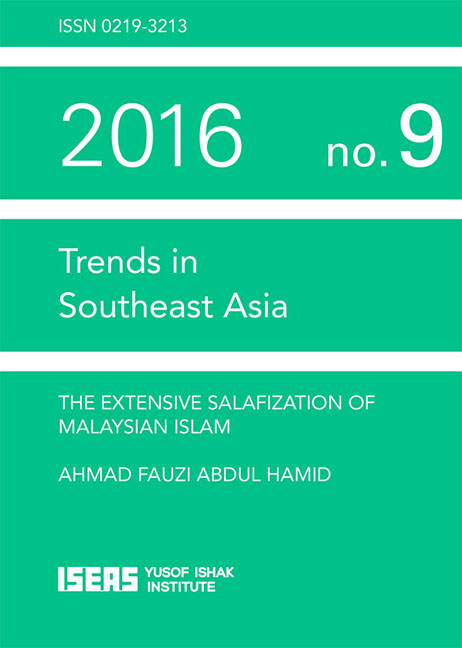The Extensive Salafization of Malaysian Islam
Published online by Cambridge University Press: 09 March 2019
Summary
EXECUTIVE SUMMARY
• The form of Islam normatively understood and practised in Malaysia, i.e. Malaysian Islam, has undergone myriad changes since the 1970s as a result of gradual Salafization. Powered by Saudi Arabian largesse and buoyed by the advent of the Internet, this new wave of Salafization has eclipsed an earlier Salafi trend that spawned the Kaum Muda reformist movement.
• Recent surveys suggest that there has been a rise in the level of extremism among Muslims in Malaysia. While the majority is far from being enamoured by the Islamic State of Iraq and Syria (ISIS), the Wahhabi-Salafi doctrine that ISIS claims to represent in unadulterated form does appeal to many of them following the decades-long Salafization of Islam in the country. This tallies with media reports on increasing numbers of Malay-Muslim youth harbouring an attraction towards radical Islamist movements such as ISIS.
• Salafization, referring to a process of mindset and attitudinal transformation rather than the growth of Salafi nodes per se, is not restricted to individuals or groups identified as “Salafi”, but rather affects practically all levels of Malay-Muslim society, cutting across political parties, governmental institutions and non-state actors. It has resulted in Islamist, rather than Islamic, ideals increasingly defining the tenor of mainstream Islam in Malaysia, with worrying consequences for both intra-Muslim and inter-religious relations.
• Responses to the Wahhabi-Salafi onslaught from the Malay-Muslim ruling elite in Malaysia have been ambivalent, and have had weak counteracting effects on the Salafization process.
- Type
- Chapter
- Information
- The Extensive Salafization of Malaysian Islam , pp. vii - viiiPublisher: ISEAS–Yusof Ishak InstitutePrint publication year: 2016



